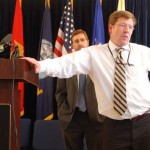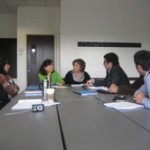ACS Presentation on 2008-09 Supreme Court Opinions
 With the beginning of the 2009-2010 term of the Supreme Court, the Marquette Chapter of American Constitution Society for Law and Public Policy (ACS) spent a lunch-hour discussing some of the more interesting cases of the past 2008-2009 term. Leading the lunch discussion were Marquette professors Blinka, McChrystal, and Secunda.
With the beginning of the 2009-2010 term of the Supreme Court, the Marquette Chapter of American Constitution Society for Law and Public Policy (ACS) spent a lunch-hour discussing some of the more interesting cases of the past 2008-2009 term. Leading the lunch discussion were Marquette professors Blinka, McChrystal, and Secunda.
Professor Blinka started the lunch discussion with Arizona v. Gant, a 5-to-4 decision written by Justice Stevens and joined by Justices Scalia, Souter, Thomas, and Ginsburg (an odd confederation to say the least). In Gant, the Court limited the scope of “search incident to arrest.” The Court held that while police can conduct a warrantless vehicle search “incident to an arrest,” police can only search without a warrant and without consent if the arrestee is within reaching distance of the vehicle or if the officers have reasonable belief that “evidence of the offense of arrest might be found in the vehicle.” Arizona v. Gant 556 U. S. ____, 2 (2009).


